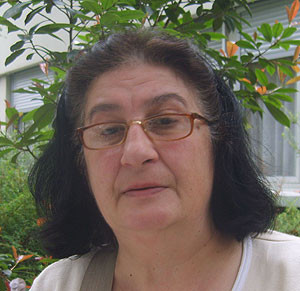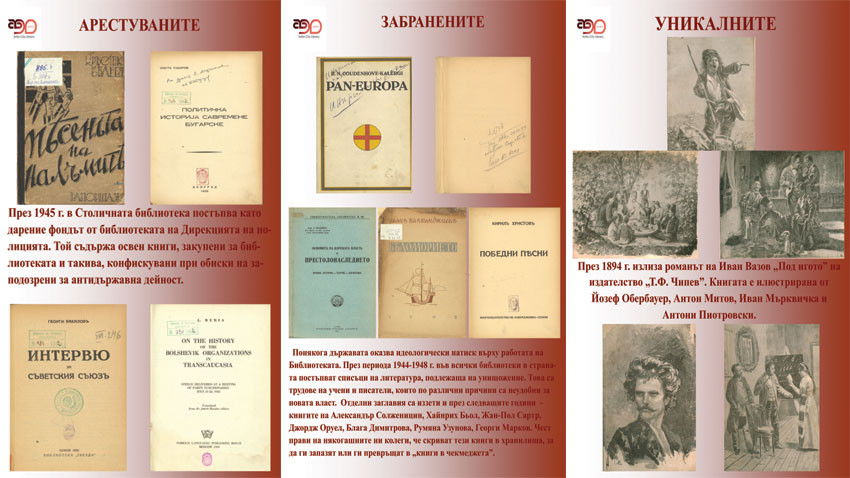On November 1 Bulgarian people pay respect to their enlighteners. These are personalities such as Saint Ivan Rilski, Paisii Hilendarski, Hristo Botev and many others, who brought the light of spirit and knowledge to Bulgarians in times when bread and survival were major issues.
In addition to these names we pronounce with pride, there are also many "silent" enlighteners. For example these are the people who make sure more meaningful and valuable books reach readers. Books are a major instrument for enlightenment and an exhibition entitled "The Fate of Books” that opened in the Sofia City Library on the eve of November 1 focuses on them. The exhibition is also dedicated to the 90th anniversary of the library. These are valuable books that have been preserved despite the vicissitudes of history. Anna Anastasova, Head of the Department of Literary Heritage in the Sofia Library told us more.
 “Since its creation back in 1928,heads of the library have been taking care for the fund in order to reach the maximum number of people in Sofia and satisfy the interests of all social groups, ages, and people who speak different languages. What is characteristic of this early period is the fact that the formation of the fund was not influenced by any political bias,” Ana Anastasova says. “For example, in 1941, Sofia Municipality granted additional funds to buy off the books of the Russian Bookstore in Sofia. In June that same year, the war between Germany and the Soviet Union started. It was a war in which Bulgaria did not want to participate and did not even break its diplomatic relations with Moscow. Due to the close relationship of Bulgaria with Nazi Germany, the bookstore was closed. The books, however, were stored in the City Library. In 1942 the library also bought the books from a great exhibition of German culture in Bulgaria."
“Since its creation back in 1928,heads of the library have been taking care for the fund in order to reach the maximum number of people in Sofia and satisfy the interests of all social groups, ages, and people who speak different languages. What is characteristic of this early period is the fact that the formation of the fund was not influenced by any political bias,” Ana Anastasova says. “For example, in 1941, Sofia Municipality granted additional funds to buy off the books of the Russian Bookstore in Sofia. In June that same year, the war between Germany and the Soviet Union started. It was a war in which Bulgaria did not want to participate and did not even break its diplomatic relations with Moscow. Due to the close relationship of Bulgaria with Nazi Germany, the bookstore was closed. The books, however, were stored in the City Library. In 1942 the library also bought the books from a great exhibition of German culture in Bulgaria."
Interesting donations were made after 1944 from the archives of the Police Directorate. There are books and documents seized in searches of people suspected of anti-state actions. A curious fact is that one of the books used to be banned under all regimes before 1989. It was banned both in the Kingdom of Bulgaria and during the Communist regime after 1944. It is called "Political History of Modern Bulgarians" by Kosta Todorov–a revolutionary and politician with turbulent life and grandfather of famous singer Kamelia Todorova.
“The first lists of books for destruction date back to the period 1944-1948. There were precisely defined topics and ‘harmful’ books that had to be removed. Some of our former colleagues knew this was not right and hid some of the books. Readers could not search for those banned titles, but they were still preserved for future times.”

Books were also hidden and prohibited between 1960s and 1980s. Among them are works by Bulgarian dissident writer Georgi Markov, who was assassinated because of his work in London in 1978. Books like the novel "Face" by Blaga Dimitrova, as well as legendary "One Day in the Life of Ivan Denisovich" by famous Russian dissident writer Alexander Solzhenitsyn also needed to be kept in secret.
During the Allied bombing of Sofia in 1944, the building of the Sofia Library was destroyed together with 40,000 volumes of books. However, after careful examination of the destroyed building, copies of valuable books were found and preserved.
Among the unique books stored in the Sofia City Library are the first editions of "Under the Yoke" by Ivan Vazov. The work was printed in Bulgaria in 1894, and a little earlier (at the end of 1893) it was published in English in London.
English: Alexander Markov
Photos: Sofia LibraryThe exhibition "Codes of Identity", which opens today in Sofia, presents ancient Bulgarian lineages that have left a lasting legacy. The venue is the National Archaeological Institute with Museum at the Bulgarian Academy of Sciences (NAIM-BAS) In..
June 11, 2007 - US President George W. Bush Jr. visits Sofia. According to protocol, the press conference he held for the media took place among the exhibits of the National Archaeological Museum. The official lunch for the guest was later held at the..
On November 10, 1989, a plenum of the Central Committee of the Bulgarian Communist Party ousted its General Secretary and Chairman of the State Council, Todor Zhivkov. This marked the symbolic beginning of the transition from a one-party system to..
On November 25, the Bulgarian Orthodox Church honours the memory of St. Clement of Ohrid – a distinguished archbishop, teacher and scholar. He was among..

+359 2 9336 661
